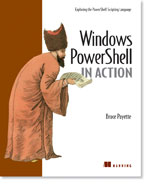/\/\o\/\/ PowerShelled
This blog has moved to http://ThePowerShellGuy.com Greetings /\/\o\/\/ $AtomFeed = ("Atom.xml")$PreviousItems = (" PowerShell RC2 and Active Directory "," PowerShell : Using IronPython to Connect to AD and... "," PowerShell Session video of Bruce Payette "," PowerShell : Active Directory Part 11 - moving - R... "," PowerShell : Learn about the HashTable Object and ... "," PowerShell : Setting SendAs permission in Exchange... "," PowerShell : Active Directory Part 10 (AD Browser) "," PowerShell "," PowerShell : How Do I randomize a list, and remove... "," PowerShell : Can you do that less cryptic ? "," ")
Friday, September 29, 2006
PowerShell : Hosting IronPython
In last post about using IronPython from PowerShell : Using IronPython to Connect to AD and list children , I did just use the CLI.
In this post I will show how to Use IronPython from Powershell, by hosting it.
I first load the DLL's needed (copy them to PSHOME directory), and then just start using it.
[System.Reflection.Assembly]::LoadFile("$pshome\IronMath.dll")
$ipe = new-object IronPython.Hosting.PythonEngine
$code = @'
import sys
import clr
import System
clr.AddReferenceByPartialName("System.DirectoryServices")
import System.DirectoryServices
from System.DirectoryServices import *
root = DirectoryEntry()
for c in root.Children: print c.Name
u = root.Children.Find("CN=FooBar")
for p in u.Properties: print p.PropertyName , p.Value
for p in u.Properties.__getitem__("CN"): print p
'@
$ipe.Execute($code)
The results are not lost you can still work with them and you can exchange variables very easy also see examples below :
# You can get back the results by using Evaluate
PS C:\PowerShell> $ipe.Evaluate('root.Children.Find("CN=FooBar")')
distinguishedName
-----------------
{CN=fooBar,DC=mow,DC=local}# Or you can get the variable
PS C:\PowerShell> $ipe.Globals["u"]
distinguishedName
-----------------
{CN=fooBar,DC=mow,DC=local}# Set a IronPython Variable
PS C:\PowerShell> $ipe.Globals['domain'] = [adsi]''
PS C:\PowerShell> $ipe.Evaluate('domain.Children.Find("CN=FooBar")')distinguishedName
-----------------
{CN=fooBar,DC=mow,DC=local}# and do a Dir (get-member) on that variable in IronPython
PS C:\PowerShell> $ipe.Evaluate('dir(domain)')
AuthenticationType
CanRaiseEvents
Children
Close
CommitChanges
As you see its very easy to mix IronPython and PowerShell parts.
Realy great !
Enjoy,
Greetings, /\/\o\/\/
Tags : Monad IronPython PowerShell

